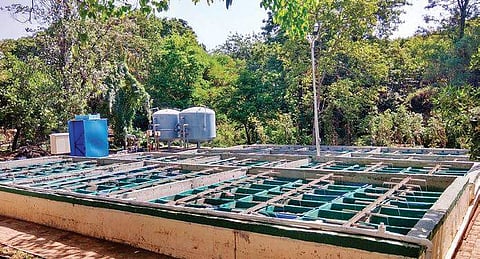

BENGALURU: The idea of using earthworms for composting is far from new. But this 50-year-old civil engineer has come up with the novel idea of exploring its application in human waste treatment – an idea that gained recognition by the Bill & Melinda Gates Foundation as well. Meet Ajeet Oak, director of TBF Environmental Solutions Pvt Ltd, which commercialises the ‘Tiger Toilet’ technology. Ahead of his talk at the sixth edition of TEDxBangalore, taking place on October 20 at Ritz-Carlton, Oak speaks to CE about where the seed for the idea came from.
Oak, who had been working towards finding solutions related to decentralise waste management, said, “The initial project was run at London School of Hygiene and Tropical Medicine and was funded by the Gates Foundation.” The process works on the simple concept of vermifiltration. “There is a filter bed overlain by media that has earthworms. The solids and the organics are trapped in the filter and consumed by earthworms, and converted to useful vermicompost.”
This process is accompanied by a reduction in pollution and pathogens. But perhaps the biggest factor behind the concept’s slowly gaining popularity is the lack of odour. “The worms keep the process aerated. So there is no generation of methane and hydrogen sulfide, which causes odour,” he explained, adding that the enzymes the worms secrete also kill the odour.
Since the inception of his venture in 2014, close to 5,000 tiger toilets – the earthworms are called tiger worms and hence the name – have been installed across 11 states in India, such as Maharashtra, Karnataka, Gujarat, Rajasthan, Kerala, Tamil Nadu, and Bihar. These units have been installed for rural families, institutions and even some upmarket farmhouses. Larger units have also been installed in municipal corporations, apartments, offices and factories.
The response has been good, with rural people getting the concept immediately. “In fact, we have had instances where people have asked neighbours to use their toilets while they were away, like one would ask a neighbour to water their plants!,” said Oak. According to him, Bengaluru has a better sewerage network coverage than most other cities in India. “What we have to see though is the treatment and safe disposal of the waste matter.”
Oak had been actively involved in disaster response missions between 1999 and 2010 in different parts of the world. He worked with international NGOs and the UN to set up or fix systems for water and sanitation infrastructure for displaced populations or those affected by disasters. “That is when I first saw how important sanitation was for public health and how critical it is to have solutions at decentralised level,” he said.